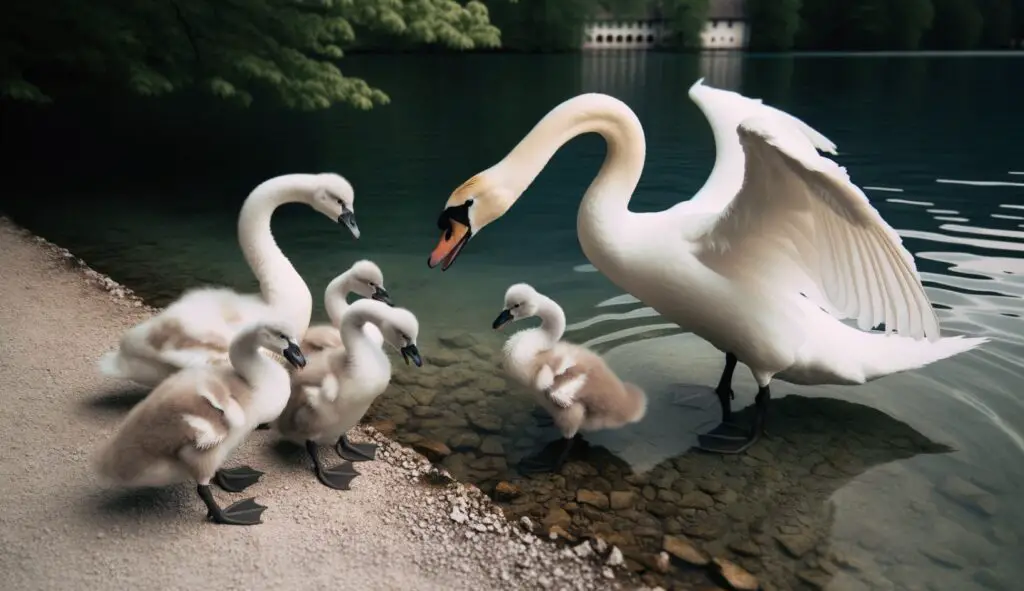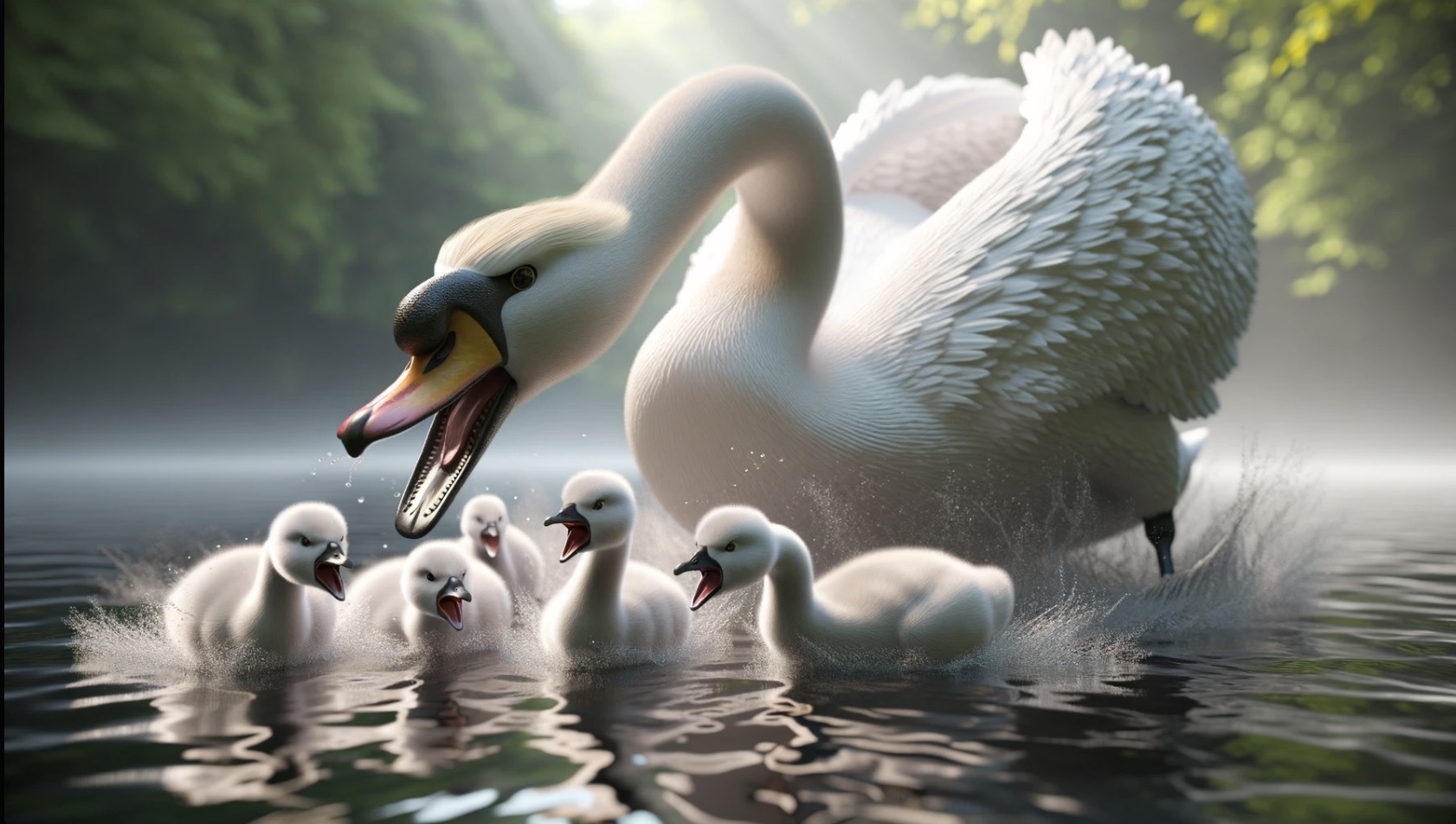Swans, with their graceful necks and elegant glide, have long captured human admiration. These birds, often seen in decorative textiles, artwork, and even in cultural folklore, raise a concern in the minds of many: Do swans kill their babies?
At the outset, it’s important to note that such instances are rare and not the norm. However, instances of aggression toward their young do occur, and this article aims to delve deep into this topic, exploring the potential reasons, implications, and comparing it with other waterfowl species.
Understanding the dynamics of waterfowl behavior, especially from a biologist’s perspective who has observed parakeets in the wild, offers unique insights into the intricacies of avian parenting.
Understanding Swan Parenting
Swans are monogamous birds, often forming pair bonds that last a lifetime. The bond is so strong that some swans even show signs of mourning if their partner dies. Once a pair forms, they engage in synchronized behaviors, like mutual preening and “mirroring” one another’s movements.

The pair works together in building nests, incubating eggs, and raising their young, known as cygnets.
The Swan Cygnet Lifecycle
Once hatched, cygnets are precocial; they are born with their eyes open and are covered in downy feathers. They are also quite active and can swim and feed within a few days. The parent swans, both male and female, take turns guarding the nest and leading their offspring to feeding sites.
As the cygnets grow, they transition from a diet of aquatic insects to more plant-based foods. By the end of the summer, the young swans develop their flight feathers and start practicing flying, eventually leaving their parents to establish territories of their own.
Instances of Swans Hurting Their Offspring
1. Mistaken Identity
While swans are generally protective parents, there have been occasional instances where they display aggression towards their own cygnets.

One reason can be mistaken identity. In areas bustling with many waterfowl, a parent swan might mistakenly see another’s offspring as a threat, especially if they stray near their own young.
2. Overcrowding and Resource Competition
Areas with high densities of swans can face issues related to overcrowding. Limited resources like food and nesting sites may lead to heightened aggression. During such times, parent swans might become aggressive towards their older cygnets, forcing them to disperse and reduce competition.
3. Aggression Due to External Threats
When faced with threats like predators, parent swans become extremely defensive. If a cygnet, due to inexperience, leads a threat like a fox or large fish towards the brood, it might face aggression from its own parents.
4. Health and Weakness Identification
Nature often has brutal ways to ensure only the fittest survive. Swans might sometimes identify weak or sickly cygnets and push them away or even attack them. This behavior ensures that only the healthiest of the brood gets the best chance at survival, as resources aren’t wasted on those less likely to survive.
Potential Reasons Behind Such Behavior
1. Evolutionary Advantages
From an evolutionary perspective, ensuring the survival of the fittest offspring increases the chances of one’s genes being passed on to the next generation. If resources are limited, it’s more beneficial for a parent to invest in healthy offspring rather than those showing signs of weakness.
2. Environmental Stressors
Human encroachment, habitat loss, and pollution might increase the stress levels in swans, leading to aggression. An environment that doesn’t provide ample resources can force swans to become more aggressive in general, sometimes even towards their young.
3. Health and Disease Factors
Diseases can alter the behavior of swans. For instance, birds infected with certain parasites or pathogens might become more aggressive or display altered parenting behavior.
How Common Is This Behavior?
Analyzing Reported Incidents
While the notion of swans hurting their babies is disturbing, it’s essential to understand the rarity of these incidents. Statistically, less than 0.5% of swan couples have been observed showing lethal aggression towards their cygnets in a given year.

Dissecting Myths and Misconceptions
Like many other animals, myths surround swans. Over time, isolated incidents might get amplified, leading to misconceptions. While there are incidents of aggression, it’s crucial to understand them in context rather than making broad generalizations.
How does swan infanticide compare to other birds and animals
Swans have been observed displaying aggressive behavior towards both conspecifics and heterospecifics, with some instances resulting in the death of the targeted individual.
In particular, attacks by Whistling Swans killed two Greater White-fronted Goose goslings during the breeding season, and a Whooper Swan attack resulted in the death of a juvenile Eurasian Wigeon in Iceland1
Moreover, various studies have explored the phenomenon of infanticide among animals, shedding light on its evolutionary, neurological, and social aspects:
- A Harvard study investigated the neural circuitry controlling aggressive behavior of adult mice towards infants, which might have parallels in other species’ infanticidal behaviors2.
- Research has explored the evolutionary determinants of infanticide by females, linking the occurrence of infanticide to the social organization and mating systems in mammals3,4.
- Long-term studies, particularly in lion populations, have suggested that male infanticide can be a major source of infant mortality, highlighting the sexual conflict aspect of infanticide4.
- An extensive collection of work on animal and human infanticide has gathered theoretical background and taxonomic distribution of infanticide, which could provide a broader understanding of this phenomenon across different species5.
Storks: From Myth to Reality
Storks, popularly associated with baby folklore, generally have a different behavior. They’re known to be attentive parents, bringing food back to the nest and taking turns feeding their young. However, there are numerous reports of storks showing aggression towards their offspring.
Instances in Other Waterbird Species
Like swans, there are instances in other waterbird species, like geese or ducks, where parents might display aggression towards their offspring, especially when resources are scarce. However, intentional killing is uncommon.
Conclusion
Swan parenting, much like the parenting strategies seen across the animal kingdom, is complex and influenced by various internal and external factors.
While rare instances of aggression towards their young can be shocking, it’s essential to view these behaviors in the broader context of survival, evolution, and environmental pressures.
By deepening our understanding of such behaviors, we not only gain insights into the intricacies of avian life but also develop a greater appreciation for the challenges faced by these magnificent birds in their natural habitats.




